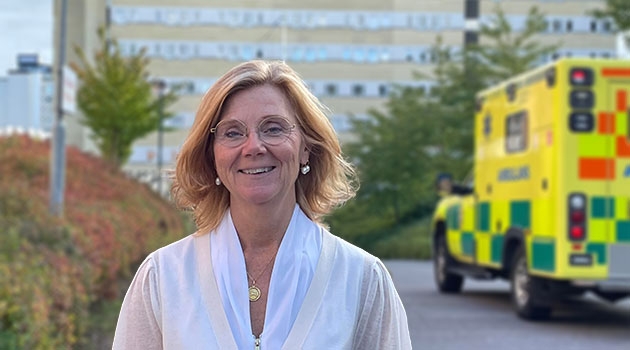Research on equality in healthcare
Researcher profile
In international maternal and reproductive health, many issues are sensitive and influenced by stigma, norms and values. Family formation and whether you can get pregnant? With whom do you want to have children or if you don't want to have children? To remain a virgin or not? Information about who is the father? Reproduction is mentioned already in the Bible, and in many countries, abortion issues are at the top of the political agenda.
One person who faces these difficult questions in her daily clinical practice is Birgitta Essén, Senior Consultant in Obstetrics and Gynaecology at the University Hospital and Professor of International Maternal and Reproductive Health. Birgitta has mapped birth outcomes and contraceptive use among immigrants and studied when cultural differences are of interest to healthcare and when they are not.
“Reproduction is a sensitive topic, and globally policy documents are guided by the political ideologies of a country, not the evidence. I want to get politics out of the gynaecology room and focus more on addressing the issues that women face, regardless of their cultural background,” says Birgitta.
A too one-sided focus on culture has been shown in research to foster intergroup prejudice and lead to a focus on something other than what the patient is seeking care for, resulting in poorer care.
“It's easy to get caught up in stereotypes and assume that what applies at a group level, for example to Muslim women from Somalia, applies to every individual, but the stereotypes can sometimes be detrimental. It can become a discrimination case because the woman wants a female physician, for example. But if we accommodate that and it is not the best physician, it can lead to problems; we can miss important information and misdiagnose.”
International global reproductive health
Birgitta trained as an obstetrician in Malmö and worked in Nicaragua before coming to Uppsala University 15 years ago. There she obtained the only position in the Nordic countries in the field of international maternal and reproductive health. The position involved research and development in global reproductive health, where Birgitta included migration-related issues.
“I was first with the migration perspective and developing global health at home. The topic includes not only the curative but preventing and providing care on equal terms. Today we know, for example, that severe cases such as maternal and perinatal mortality are associated with the GDP of the country of birth.”
Culture clashes in the healthcare encounter
Socio-cultural values influence how a diagnosis is made, studies in collaboration with anthropologists and sociologists show. During the Covid pandemic, when hand-shaking was banned, relatives were not allowed to participate and everyone covered their faces, it was discovered how healthcare workers reflected on norms they had previously taken for granted.
“Caregivers were adaptive, able to adjust and spontaneously resolve different care situations. This reflective ability is something we want to highlight and strengthen in other contexts," Birgitta emphasises. “The optimal care encounter is where physician and patient meet as two experts in the room. It's a balancing act where you meet the person with curiosity rather than preconceived notions, but the physician remains an expert on the biomedical and the patient on their own experience of illness. It is not about special care for Muslims but about equal care while taking into account cultural reasoning to understand the patient’s experience.”
Greater risk of dying in childbirth
As a foreign-born woman from Africa, there is an increased risk in Sweden that the mother or baby might die during childbirth. This finding has been around since the 1990s and to reduce the risks, culturally sensitive approaches have been taken, such as having a doula present at the birth. Unfortunately, despite interventions, follow-up studies show that the risk has not been reduced.
Holmdahl Prize by Anders Hagfeldt on the
University's birthday on 7 October.
“The premature death of these women may be due to several factors,” says Birgitta. “The first is communication problems and the lack of use of interpreters, which works better today. The second is that these women may have rare diseases we in Sweden are not used to, and this can delay diagnoses such as heart failure or tuberculosis. Finally, it was confirmed that socio-economically vulnerable families are more at risk.
But the research results showed no influence of any culture-specific factor.
“This is very interesting, and I would like to point out that this has become a fallacy in healthcare. We haven’t found anything that requires increased cultural competence in maternity care. Nor is there any cultural tradition that could influence the fact that Somali newborns have a higher risk of dying in Sweden.
“Instead, we can improve social factors but not as physicians, it is a political issue at the societal level. In healthcare, we can create better practices and give nurses and midwives more time with these particular migrant women instead of a doula with no medical training at all. We can also include the father in the delivery room, as we have done in Sweden since the 1970s. My hope is that these issues are raised in healthcare programmes and that it is not seen one-sidedly to the ethnic background - neither by the healthcare provider nor the patient. It should be care on equal terms,“ concludes Birgitta Essén.
Annica Hulth
Facts: Birgitta Essén
Occupation: senior physician in obstetrics and gynaecology at Uppsala University Hospital and professor of international women's and maternal health care at Uppsala University.
Lives: In Uppsala but my heart is in both Spain and Nicaragua.
Current: as the recipient of the 2022 Martin H:son Holmdahl Prize for efforts to promote human rights and freedoms.
Hobbies: mountain hiking.
Dream trip: Soon to be everywhere, but would love to go to Svalbard and Machu Picchu.
Makes me happy: when I get good feedback from a patient meeting.

